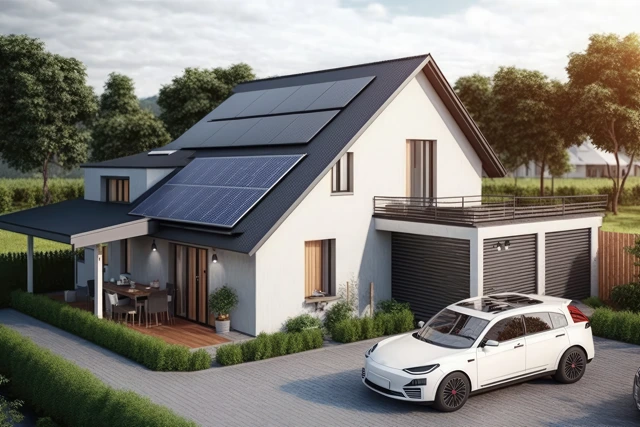As more and more people switch to electric vehicles (EVs) to reduce their carbon footprint and save on fuel costs, the demand for efficient and convenient EV Charging solutions has grown significantly. Home solar EV charging has emerged as a popular option. They are providing EV owners with a sustainable and cost-effective way to charge their vehicles while avoiding the need for grid power. Rooftop solar panels, in particular, are the best way to get that solar electricity. However, one of the most important factors is the time to charge an EV using solar power entirely. In this blog post, we’ll explore everything you need to know about home solar EV charging times, including the factors that can affect charging times and how to optimize your charging setup for maximum efficiency.
Jump A Head
- ➤ Factors affecting Solar-powered EV Charging time.
- ➤ Calculating Solar-Powered EV Charging Times.
- ➤ Tips for Maximizing Solar-Powered EV Charging Time.
- ➤ The Future of Solar-Powered EV Charging.
Factors affecting Solar-powered EV Charging time.
Several factors must be considered while calculating the Charging time from solar panels. In this article, we will only discuss the major ones that have a direct impact. Size of a solar panel system, Capacity of the EV battery, Weather conditions and types of EV charger in use.
Size of a solar panel system:
First, let’s discuss how solar panels work. Solar panels convert sunlight into DC (direct current) electricity; these DC are unsuitable for powering your AC(Alternate current) based appliances, including EV chargers. DC is then converted to AC using solar inverters. After this, only usable electricity flows through the system. The amount of electricity generated by a solar panel system depends on the size and efficiency of the panels, as well as the amount of sunlight available. Typically, rooftop solar panel systems range from 5kW to 15kW. A larger solar panel system will generally produce more energy so that you can charge your EV more quickly.
The capacity of the EV battery:
When it comes to solar EV charging, the size of the battery can affect how long it takes to charge fully. EVs with larger battery capacities typically take longer to set using solar power, requiring more energy to reach a full charge. This is measured in kilowatt-hours (kWh), ranging from 24kWh to 100kWh or more. Most common EVs have a battery capacity of around 65kWh, providing a driving range of about 350km. Depending on factors such as driving efficiency and conditions. Generally, each kWh of battery capacity will give you around 5km to 8km of driving range.
Weather Conditions:
The weather conditions in your area can significantly impact the effectiveness of solar Electric vehicle charging. Solar panels rely on sunlight to generate electricity, which means that cloudy or overcast weather can reduce the amount of energy produced. Heavy rain, snow, or hail can damage or make solar panels less efficient. Additionally, the temperature can also affect the performance of solar panels. Very hot temperatures can cause solar panels to become less efficient, while frigid temperatures can reduce the panels’ lifespan.
Types of Home EV chargers in use to charge an EV:
Home EV chargers come in different types. Level 1 home charging and Level 2 home charging. These two levels have different charging speeds. Clean Energy Reviews conducted an EV Charger test using the BYD Atto 3 electric vehicle to compare the efficiency of a portable 10amp charger (Level 1 charger) and a 7KW wall box charger (Level 2 Charger). The results revealed that the 10amp charger exhibited an efficiency nearly 10% lower than that of a home charger, attributed to its lower charging rate and losses in the charging cable.
Level 2 EV chargers are widely used in Australian households and are also recommended by EVPowerhouse to get maximum energy from the solar panel system. Level 2 chargers come in two phases one is a Single-phase(7kW), and the other is a Three-phase(22kW).
Single-phase (7kW) EV charger:
An average EV is recharged in 8 to 10 hours using a regular single-phase 7kW Wallbox charger. Charging a solar-powered EV using a 7kW single-phase EV charger with a 10kW solar system is feasible during favourable weather conditions. Nevertheless, a wise alternative would be to use a smart EV charger that can dynamically regulate the Charging speed to align with your solar energy production.
Three-phase (22kW) EV charger:
The three-phase version of EV chargers can supply three times more power than the single-phase version, which equates to about 22kW of charging power. This power level can provide an EV with a range of 120 to 150km per hour at a maximum charge rate. With a 22kW three-phase Wallbox charger, it is possible to fully recharge an average EV in less than three hours. However, when relying solely on solar power for EV charging, even with a large 15kW+ solar system, achieving this level of charging power can be challenging, particularly during cloudy weather. To address this challenge, use a three-phase EV charger set at a lower charge rate, such as 12kW. Or preferably a three-phase smart EV charger, which can dynamically adjust the charge rate to match the solar output.
Calculating Solar-Powered EV Charging Times.
We will consider two factors to calculate the Charging time. One is the size of solar panels, and the other is the battery capacity of an EV. For this calculation will use the given formula to get the estimated charging times:
- Charging Time = Battery Capacity (kWh) x Charging Efficiency / Solar Panel Output (kW).
For example, to charge from 20-80%, a popular BYD Atto 3 uses Home Solar Charging. Let’s assume the size of the solar panel is 6kW. The usable battery capacity is 60kWh, and the charging efficiency at 0.85.
- Charging Time = 60 kWh x 0.85/6kW = 8.5 hours.
It will take a long sunny day to fully charge a BYD Atto 3 or other average EVs.
The above calculation omits the types of EV chargers, weather conditions and other factors. Also, most of the time, the household load is high, and the weather is not in our favour(not sunny). In this situation, a Smart EV charger will help to give the option to toggle between grid or solar. This Smart Ev charging station will ensure you do not pay the grid power unknowingly.
These calculations might be overwhelming, but You can use the free solar calculator to calculate how much solar you need to charge an EV.
Tips for Maximizing Solar-Powered EV Charging Time.
Maximizing solar-powered charging time requires careful planning and execution to ensure you generate the maximum energy possible. Here are some tips to help you get the most out of your solar-powered EV charging system:
- Optimize Your Solar Panel System: Optimizing your solar panel system is essential to maximize solar-powered EV charging time. This means ensuring that your panels are positioned correctly to receive maximum sunlight, removing shading, and regularly cleaning the panels to ensure total energy production. Investing in high-efficiency solar panels and a high-quality inverter can also help improve energy generation.
- Invest in Smart Charging Technology: Smart charging technology can also help maximize solar-powered EV charging time. A Smart EV charger can communicate with your solar panel system to ensure that your EV is charged during periods of maximum energy production. This means you can take advantage of the energy generated by your solar panel system when it is most abundant, ensuring that your EV is fully charged and ready to go when needed. Additionally, a Smart charger can help balance the load on your electrical system, preventing overloading and improving overall charging efficiency.
The Future of Solar-Powered EV Charging.
Solar-powered Electric vehicle charging has become increasingly popular over the past few years, and the future of this technology looks bright. With advancements in solar panel technology, battery storage, and EV charging infrastructure, we expect to see more efficient and affordable solar-powered EV charging systems.
One area of development is the integration of solar panels directly into EVs. Some automakers, such as Hyundai and Toyota, have already released concept vehicles with solar panels on the roof. That can charge the battery while driving. This technology could reduce the reliance on charging infrastructure and provide a more sustainable and convenient way to power EVs. In addition, battery storage technology is becoming more affordable and efficient. This could enable EV owners to store excess solar energy generated during the day and use it to charge their vehicles at night.
Bottom Line
Transitioning to green-powered transportation is a significant step towards a more sustainable future. And home solar Electric vehicle charging systems are playing a crucial role in achieving this. With the continuous advancements in solar panels and EV battery technology, charging times are rapidly decreasing, making range anxiety a thing of the past. By harnessing the sun’s power to charge your EV, you reduce your carbon footprint and save money on energy bills.
Furthermore, with various state and federal-based EV incentives, the adoption of EVs and solar-based grid systems is rising. These incentives make EVs more affordable and accessible to a broader audience while promoting renewable energy sources. Investing in a home solar EV charging system can take advantage of these incentives and contribute to a cleaner, healthier planet for future generations. Leap solar-powered transportation and join the green revolution today.

